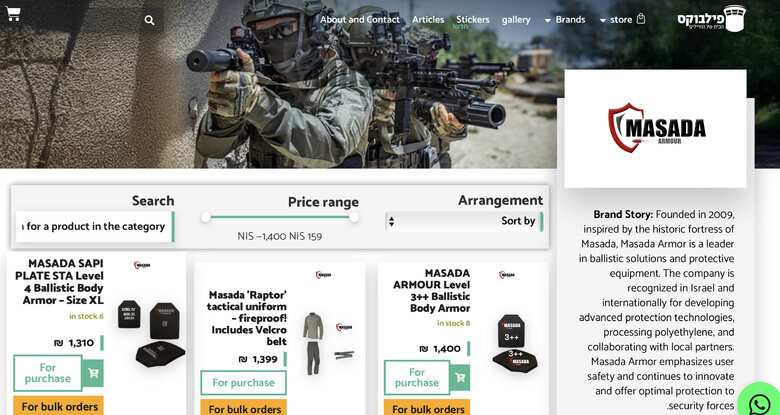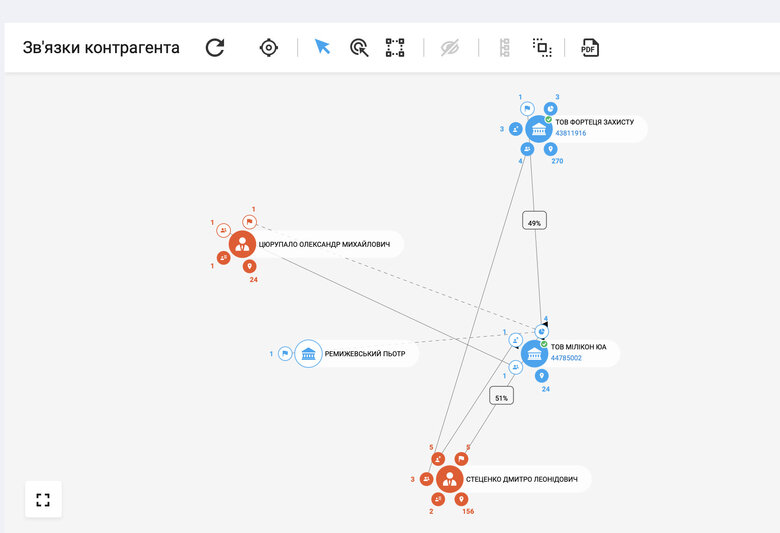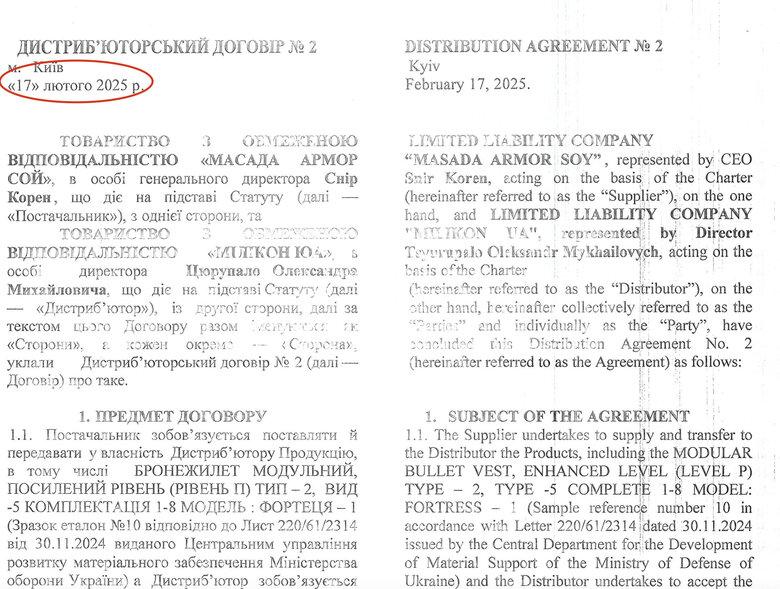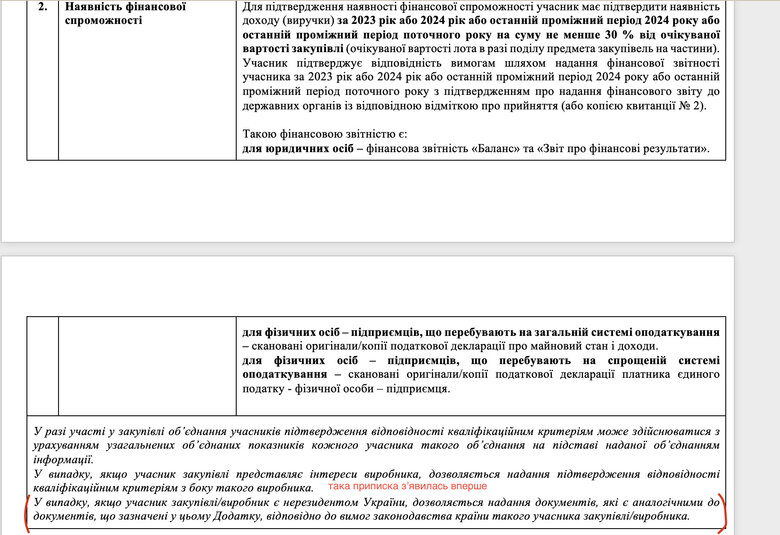How DOT purchases Israeli bulletproof vests through shell companies
Despite Ukraine entering its fourth year of war, the issue of supplying the military with bulletproof vests remains critical in our country. The problem is that the Ukrainian manufacturer offering the lowest prices cannot fully meet the demand, while others cannot afford to sell below cost.
For more than a year, the State Operator for Non-Lethal Acquisition (DOT) has been searching for a solution to this situation.
However, after the latest bidding, it appears that there is a clear intent to procure bulletproof vests from a specific company—an Israeli supplier—through a shell company.
The eternal corruption issue—overpricing—is not present in this case. However, there are evidently concerns regarding other corruption risks. Let's examine what is wrong with the procurement of bulletproof vests.
The first issues with DOT’s bulletproof vest procurement arose as early as April last year. The Logistics Forces Command had submitted a request for 90,000 units. By April, Ukrainian manufacturers were capable of supplying just over 60,000, but another problem emerged. The estimated cost proposed by the largest Ukrainian manufacturer, Temp 3000 (UAH 27,348.21 per set), was unaffordable for other suppliers. For instance, Ukrtac LLC offered a price of nearly 34,000, while KhZZIZ LLC proposed 44,000. (KhZZIZ (Kharkiv Individual Protection Equipment Plant), a Ukrainian manufacturer of personal protective equipment, including bulletproof vests for military, police, and civilian use, as well as pouches and load bearing equipment - ed.note)
The DOT held its first tender for bulletproof vests in the ProZorro system on January 19, 2024. Of the five announced lots, only two were successfully awarded, with Temp 3000 winning at a price of UAH 26,570.00 per set.
A total of 20,000 bulletproof vests were scheduled for delivery by April 30. However, an additional agreement postponed the delivery of 15,000 units until the end of June.
On January 21, the DOT conducted another tender, awarding another 10,000 bulletproof vests—this time at a price of UAH 34,407 per set.
In February, the situation worsened further: out of the planned 40,000 bulletproof vests, only 5,000 were procured from Ukrtac at a price of UAH 26,480 per set.
In March, the DOT began purchasing separate carriers into which intact armor plates could be transferred. A total of 30,000 carriers were procured from Temp 3000.
Temp 3000, however, agreed to supply only 6,250 bulletproof vests, but at a price of UAH 24,320.00 per set.
With the funds saved from previous tenders, the DOT requested permission from the Ministry of Defense to contract Temp 3000 at full capacity and then allow purchases from other manufacturers at higher prices. The relevant requests were reviewed by the Logistics Forces Command and the then Deputy Minister of Defense, Dmytro Klymenkov. In the end, Klymenkov authorized procurement at higher prices.
As a result, in May, the DOT procured 11,840 sets from Ukrtac at a price of UAH 30,780.00, 20,000 from the Kharkiv Personal Protective Equipment Plant at UAH 30,389.50, and another 10,000 sets from AK-INVESTPROM LLC at UAH 30,700.00 through a simplified procedure.
However, on June 18, the DOT launched another tender with a price of UAH 26,000 per set. As a result, out of the 105,000 required, only 15,000 sets were awarded, all of which went to Temp 3000. The bidding for eight lots was canceled.
The next tender, announced in July for 20,000 sets—on July 19 and 25—was canceled twice due to a lack of bids. The price was set at UAH 27,441.50.
Only in September, at an estimated price of UAH 28,500 per set, the DOT managed to contract 15,000 units from Temp 3000 and another 24,000 from Ukrtac. In October, an additional 1,200 units were procured from Temp 3000.
In November, the DOT procured 30,000 sets from Temp 3000 and KhZZIZ. The latter even managed to offer 10,000 bulletproof vests at a price of UAH 24,983.74 per set.
In other words, throughout 2024, only Ukrainian manufacturers participated in bulletproof vest tenders.
However, something changed drastically in December 2024. On December 12, the DOT announced a tender for nearly 75,000 bulletproof vests. A company called Fortetsia Zakhystu (a general trading and logistics firm - ed. note) participated in all bids—and in every case, it offered the lowest price.
Fortetsia Zakhystu was established in 2020. Its authorized capital is UAH 500. Classifier of Economic Activities (KVED) is non-specialized wholesale trade, while its secondary KVED covers the provision of transportation services.
Despite this, the company sought to supply tens of thousands of bulletproof vests worth over UAH 1.5 billion.
Fortetsia Zakhystu is a distributor of the Israeli company Masada Armor Soy, with which it signed a contract on October 9, 2024.
It should be noted that during the procurement of bulletproof vests in 2024, the DOT established only two qualification criteria:
- Documented experience in executing a contract (s) similar to the subject of procurement.
- Financial solvency, confirmed by financial statements.
As a financial guarantee, Fortetsia Zakhystu submitted financial documents from Masada Armor Soy.
However, according to Clause 8 of Annex No. 1, a bidder must submit a copy of a license or an official order for the issuance of a license for the production of personal protective equipment as part of the tender submission.
It is evident that Fortetsia Zakhystu does not engage in any production.
Thus, it cannot be recognized as the winner. However, other key Ukrainian manufacturers remain in the competition, including Temp 3000, KhZZIZ, and Ukrtac.
However, instead of proceeding to the next candidates after failing to receive the required documents from Fortetsia Zakhystu, the DOT canceled the tender altogether.
Censor.NET sent an inquiry to the State Operator for Non-Lethal Acquisition regarding this procurement.
Before that, however, it is worth recalling that SE "DOT" conducts defense procurement in accordance with the requirements of the Law of Ukraine "On Public Procurement" and Cabinet of Ministers Resolution No. 1275. Part 17 of Article 14 of the Law "On Public Procurement" outlines the grounds on which the Contracting Authority may cancel a simplified procurement, specifically:
1) The absence of further need to procure goods, works, or services;
2) The inability to eliminate violations arising from identified breaches of public procurement legislation;
3) A reduction in expenditures for the procurement of goods, works, or services.
None of the above, however, actually serves as a legitimate basis for cancellation.
The reason provided by the DOT is that the tender documentation did not specify the requirement to obtain a license for the sale of personal protective equipment. Therefore, "given the impossibility of making changes within the framework of the announced procurement," the tender was canceled.
In response to Censor.NET’s inquiry, the DOT stated:
"As foreign manufacturers participated in the tender for the first time, the State Operator for Non-Lethal Acquisition (DOT) sought clarification from the Ministry of Internal Affairs (MoIA), which serves as the licensing authority for personal protective equipment (PPE), regarding licensing requirements."
"According to these clarifications, a manufacturer holding a license for PPE production must also obtain a license for its sale. Meanwhile, a distributor selling in Ukraine products manufactured by a non-resident company that holds a production license in its home country is required to obtain a license for sale within Ukraine," the response stated.
However, in reality, this restricted only one participant, and the DOT could have selected other suppliers. Yet, for some reason, securing this particular supplier seemed to be of special importance to the DOT.
The same situation occurred with the tender on December 18, in which Temp 3000 and PAKOPTTORG LLC participated.
After the tender on January 16, the DOT finally contracted 55,000 sets of bulletproof vests from Temp 3000 at a price of UAH 22,699 per set. The company is required to deliver the vests by October 2025.
However, in February, things take an interesting turn again.
In addition to Temp 3000 and Ukrtac, MILICON UA LLC is also bidding. The company was established in August 2022, with an authorized capital of UAH 160,000. Its primary KVED is non-specialized wholesale trade, while its secondary KVED covers weapons manufacturing.
So far, there have been no signs of the company’s participation in public tenders—just like Fortetsia Zakhystu.
But here’s the interesting part: MILICON UA LLC was founded by the same individuals as Fortetsia Zakhystu. In fact, their ownership structure is nearly identical— Fortetsia Zakhystu owns 49% of MILICON UA, while the remaining 51% belongs to Dmytro Stetsenko, the owner of Fortetsia Zakhystu.
Youcontrol data
Milicon UA also acted as a distributor for the Israeli company Masada Armor Soy. Moreover, while the tender was announced on February 20, the documents with the Israeli company were signed just three days before the tender, on February 17.
The qualification criteria were also tailored specifically to this company.
However, this is not even the most ridiculous part—no one really tried to hide their connections.
According to Temp 3000's complaint: "The bidder, MILICON UA LLC, did not provide a document issued by the Central Logistics Development Department of the Armed Forces of Ukraine for the proposed procurement in its own name (MILICON UA LLC). Instead, it uploaded a document issued to another legal entity—Fortetsia Zakhystu LLC. The submitted documents contain no confirmation of an association, consortium, or any other form of joint activity between Fortetsia Zakhystu LLC, which was issued Letter No. 12-11 dated 12.11.24 on the approval of the sample-standard of the modular bulletproof vest 'Fortress-1' (Type 2, Level P, Type 5, Configuration 1-8), manufactured by MASADA ARMOR SOY LTD, and MILICON UA LLC."
On February 27, the DOT signed a contract with what appears to be a shell company. This company will supply 10,000 bulletproof vests at a price of UAH 21,752.00 per unit, with a total contract value of UAH 217.5 million.
What’s particularly odd is that exactly a year ago, Masada Armor Soy had already participated in DOT's tender for bulletproof vests. Even then, it was the lowest bidder. However, the company failed to submit a translation of its documents, which led to its disqualification. As a result, Temp 3000 won the tender.
Now, let’s take a closer look at the Israeli company itself.
Masada Armor is an Israeli startup founded in 2009 by Snir Koren, who specialized in the production of military textiles. In 2017, the company underwent significant changes with the arrival of two new partners—Oren Gruber and Yair Rosenberg.
Since then, the company has expanded its production capabilities and established itself as a manufacturer of personal protective equipment.
Snir Koren (34 years old) is the company's CEO. He served in the army as a soldier in the Givati Brigade and later earned a degree in industrial engineering and management.
The company's website features body armor plates with Level IV protection.
In conclusion, here’s where things stand.
For a year, the DOT has failed to solve the equation of how to properly supply the military with bulletproof vests in the required quantity. Currently, the Logistics Forces Command receives about 10,000 sets from the DOT every month, whereas at least 20,000 are needed.
In Ukraine, there is a significant disparity in producer prices, largely caused by the fact that one company had long maintained a monopoly. Meanwhile, others—despite significantly improving their production capacity—are now either forced to operate at a loss or are unable to secure any orders at all.
"According to the results of the market analysis, as of today, Ukrainian manufacturers do not fully meet the actual demand of the Armed Forces of Ukraine for bulletproof vests. SE 'DOT' is conducting market consultations with international partners and manufacturers to ensure 100% coverage of the Armed Forces' needs for bulletproof vests. It should be noted that SE 'DOT' carries out procurement in accordance with the lists and procurement volumes provided by the Ministry of Defense. However, these lists and volumes are determined strictly within the limits of available financial resources and do not always reflect the actual demand," the DOT stated in its response to Censor.NET's inquiry.
At the same time, even if there is a need to source bulletproof vests from foreign markets, it remains unclear why the DOT does not attempt to do so directly. For example, Ukrzaliznytsia purchases fuel directly from the European producer Orlen. Meanwhile, the DOT also buys fuel from the same producer—but through Ukrnafta.
The DOT could have procured bulletproof vests directly from the Israeli company, yet for some reason, it chooses to purchase them through an intermediary—while clearly favoring that intermediary in the bidding process.
In its first year of operation, the DOT takes great pride in the funds it has saved, making this the primary focus of its work. So far, price has been the main indicator of corruption in procurement. At the same time, when the DOT fails to notice a contract breach for several months and does not terminate the agreement—as in the case of Farminko—or accidentally makes an error that results in only one company, Resource Oil A, participating in the bidding and effectively controlling the tender on behalf of representatives of an Israeli company, so it is only logical to question other corruption risks in the DOT’s operations.
Tetiana Nikolaienko, Censor. NET





